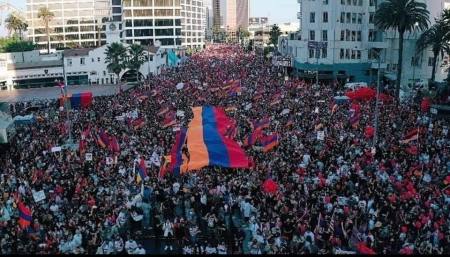Azerbaijan says it will protect Christian churches while taking over Armenian-controlled area

As Christian civilians continue to flee the disputed Nagorno-Karabakh region, the president of Azerbaijan promised to protect churches when the Muslim-majority country’s forces take possession of areas formerly controlled by Armenians.
President Ilham Aliyev made the promise during a phone conversation with Russian President Vladimir Putin, who brokered a ceasefire between the two countries last week that allows Azerbaijan to take control of the ethnic Armenian region, The Associated Press reported Sunday.
“President Aliyev said that Christian churches in Azerbaijani territories, which are returned to Azerbaijan in accordance with the trilateral statement, will also be properly protected by the state. Christians of Azerbaijan will have access to these churches,” Aliyev’s office said in a statement.
Putin is also deploying peacekeeping forces in the conflict areas after hundreds, if not thousands, of troops and civilians have been killed in the fighting since late September, the newswire added.
Azerbaijan has extended the deadline until Nov. 25 for the withdrawal of Armenian armed forces and of Armenian residents from the Kalbajar area, which had been controlled by ethnic Armenians, who are mostly Christians, for decades and is home to the Dadivank monastery of the Armenian Apostolic Church, according to Voice of America.
Some ethnic Armenians are destroying their own homes before leaving.
“In the end, we will blow it up or set it on fire, in order not to leave anything to Muslims,” a resident, identified as Garo Dadevusyan, was quoted as saying.
“We are homeless now. We do not know where to go and where to live ... It is very hard,” his wife, Lusine, was quoted as saying.
Many Armenians have demanded the resignation of Armenian Prime Minister Nikol Pashinian for agreeing to sign the agreement with Azerbaijan brokered by Russia.
The conflict started in the 1980s when the Soviet Union began to fall apart. While Russia brokered a ceasefire in 1994, clashes have continued. Mostly Armenians live in the Nagorno-Karabakh region, but the region is internationally recognized as a part of Azerbaijan.
Armenians recognize the region as the Republic of Artsakh, which Armenians say is part of their ancestral homeland.
Last week’s agreement came after several earlier ceasefire agreements in recent weeks had failed, and will for now stop the advancement of the Azerbaijan military with the help of its ally and NATO member Turkey in the separatist-controlled region.
“They lost not only lives but ancient land; this is Anatolia’s indigenous people. They lost a very important city, culturally and religiously in the city of Shushi,” Robert Nicholson, president of the Philos Project, said last week.
The Philos Project is a New York City-based nonprofit that raises up Christian leaders to advocate for a pluralistic Near East where religious communities can live beside each other in peace.
“I think objectively it’s fair to say that this deal does nothing for Armenians but hurt them. They gained absolutely nothing but a cessation of violence that they did not initiate, to begin with. I think Pashinian himself has expressed lots of regret and sadness. We can never know the factors that he has to weigh out and balance and no doubt he made what he thought was the best decision considering the circumstances. But the Armenian people are worse off because of it.”





















